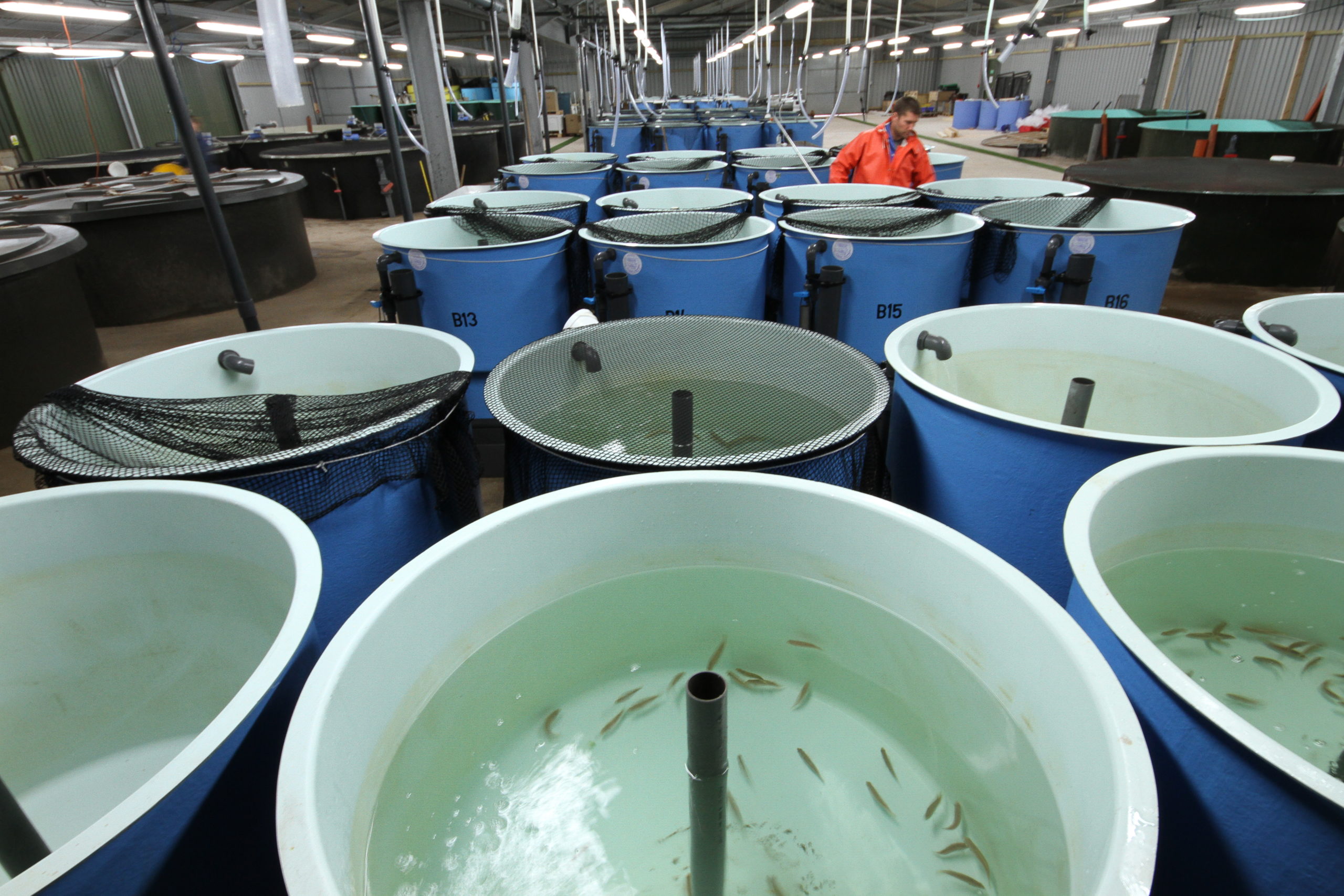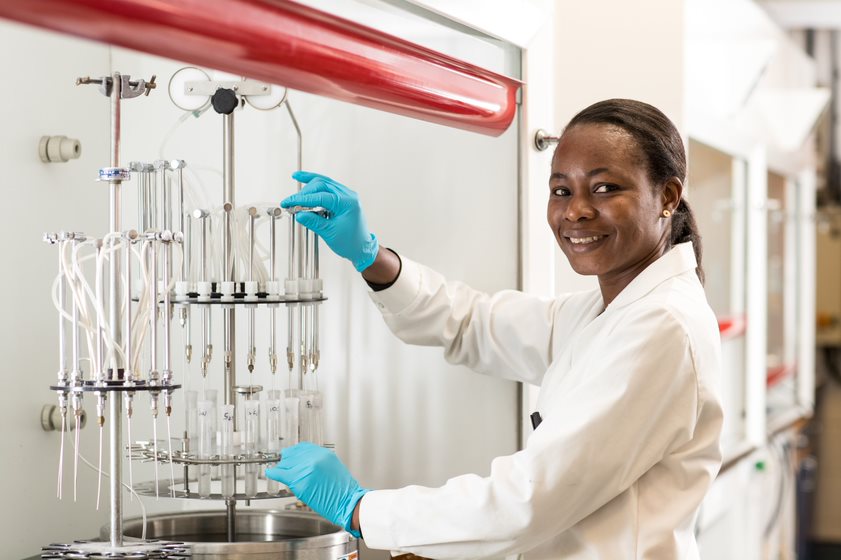50 years of research and teaching excellence

- Machrihanish Environmental Research Laboratory
- Pioneering and commercially relevant research in partnership with leading aquaculture companies
The Institute of Aquaculture is celebrating a half century at the cutting edge
In 1971 Prof Ron Roberts was awarded Nuffield Foundation funding to establish a Unit of Aquatic Pathobiology focusing on fish disease. This formed the nucleus of what, in 1980, formally became the Institute of Aquaculture (IoA). This year, along with the aquaculture industry in Scotland, it celebrates its 50th anniversary, having grown to become the leading Aquaculture Centre and one of the largest concentrations of expertise dedicated to aquaculture in the world. The Institute works with fish farmers, governments, regulatory bodies, industry, pharmaceutical companies, supply chains, veterinarians, and other academic institutions to tackle global problems of food security, hunger, and sustainability through aquaculture. Over the last 50 years, a number of defined research facilities have been established, to organise and manage the complexity of work in particular areas of the Institute, as well as to house the increasing sophistication of technology.
Global Reach: With an early focus on Scottish and UK trout and salmon aquaculture, IoA soon widened its scope internationally. Long-term expertise and support have been provided to ODA, (now DFID) FAO, British Council, Worldfish and other aid agency projects meaning that IoA has had a powerful input to global aquaculture development. Work on tropical aquaculture developments began early on and was expanded with major funding from ODA in 1977. This enabled appropriate research facilities to be established in the Institute and, at the same time, projects in Israel, Kenya, Bangladesh, Mexico, etc, to be further developed. By 1978 IoA was able to officially open a large tropical aquarium to maintain broodstock, a tilapia reference collection, to produce large quantities of fish fry for research and to house numbers of finely controlled experimental tank systems.
Industry support: IoA has maintained a close working relationship with industry throughout the 50 years. The Institute’s research and business hub offers consultancy and expertise in developing technology and practice, built on expert staff, facilities and networks. These services are delivered through a range of units tailored to the requirements of industry (see website). The opening of Machrihanish Marine Environmental Research Laboratory enabled large-scale work with industry, pioneering production of triploid salmon, cod, halibut and wrasse.
Research Excellence: IoA research has generated thousands of scientific publications, innumerable books and specialist reports. This high quality, high impact work has been recognised in successive Research Quality Assessments (RAE and REF) – the IoA consistently ranked very highly in the UK agriculture unit of assessment. One of the many reasons for this success has been the Institute’s multidisciplinary approach to finding solutions to problems in aquaculture. IoA has a policy of mixing and integrating experts in all disciplines relating to the whole subject area of aquaculture.
Teaching and Training: IoA is the only international postgraduate Institute covering tropical and temperate finfish and shellfish in extensive and intensive culture. The Institute offers a Masters and Postgraduate Diploma in Sustainable Aquaculture, and a unique Masters in Aquatic Veterinary Studies and Aquatic Pathobiology. Doctoral training is a key part of the Institute’s research portfolio, generating 300 PhD graduates who, together with 1100 Masters graduates are to be found in senior roles throughout world aquaculture.
Industry, producer, and regulator-focused short courses at all levels have been a key feature since 1972 and continue to provide a targeted, upskilling CPD resource for aquaculturalists and veterinarians.
IoA also offers specialist in situ training and extension in many different countries through courses and workshops. This attracts students from around the world to Stirling, developing long-term relationships, to offer overseas placements at Masters and PhD levels – a feature that is very attractive to potential students.
A Strategic Future: IoA has an international reputation for teaching, world-class research, technological innovation and consultancy in aquaculture. The Institute leads the world in their vision to tackle global problems of food security, hunger and sustainability through aquaculture. IoA’s impact and international reach over 50 years has been recognised through a recent award of the Queen’s Anniversary Prize, the UK’s most prestigious academic honour.
What about the future? Consolidation into three interconnected research groups – Production, Health and Environment – will allow IoA to enhance its strategic aims. IoA’s mission is to deliver the research and innovative solutions to transform the global aquaculture sector to achieve greater sustainability, enhance food security and deliver resilience of aquatic ecosystems in a changing world. Recent infrastructure investment of £17m from the City Regional Deal and £1.7m from the University of Stirling, for new facilities, position the Institute to lead the National Aquaculture Technology and Innovation Hub, based at Stirling. This provides IoA with the opportunity to promote aquaculture innovation, training and research for the future needs of industry and for sustainable aquatic food production.
W: www.stir.ac.uk/about/faculties/natural-sciences/aquaculture E: aquaculture@stir.ac.uk

Featured: Working with fish farmers in Bangladesh – Photo: ©Mahmoud Eltholth

Timeline:
50 years of Milestones
1970s
• Establishment of the Nuffield Unit of Aquatic Pathobiology
• First MSc in Aquatic Veterinary Studies/Aquatic Pathobiology
• First PhD students registered
• First Short Course launched for fish farmers and for those involved in water use
and management
• Masters and Postgraduate Diploma in Aquaculture and Fisheries management launched
• Launch of Journal of Fish Disease. Eds: Ron Roberts & Rod Wootton
• Tropical aquaculture facility funded by ODA, opened by Dr Dennis Hall [Chief Fisheries Officer, ODA]
• University purchased Howietoun to be run commercially
1980s
• Inauguration of The Institute of Aquaculture [IoA]
• Howietoun produces first Ballantine trout
• NERC Aquatic Biochemistry Unit merges with IoA
• Unit of Aquaculture Nutrition established
• Launch of the Institute’s newspaper Aquaculture News distributed to present and
past members of the Institute and to industry
• IoA Tilapia Research Team nominated for UNESCO Science Prize
• DFID Prawn Unit opened by Minister for Overseas Development, Timothy Raison
who also visits Howietoun
• Howietoun Sea Farm opens at Dunstaffnage
• Aquatic Vaccine Unit established
• STAQ, Stirling Aquaculture, consultancy established
• Launch of BSc Aquaculture programme
• Opening of DFID Tropical Fish Virology Unit by Chris Patten MP, Minister for Overseas Development
• Stirling Aquatic Technology begins trading (5 Farmocean cages, Firth of Lorne)
• The Princess Royal, Princess Anne, visits Tarbert Fine Foods to see Institute
Salmon being processed
• IoA gains top 4* rating in first UGC Research Selectivity Exercise
• IoA appointed to run ODA Aquatic Research Programme
1990s
• IoA awarded Queen’s Award for Export Achievement
• Aquatic Systems Group established
• HRH Princess of Wales, Lady Diana, opens Wolfson Aquatic Biotechnology Laboratories
• Launch of Journal of Aquaculture and Fisheries Management – later Aquaculture Research
• NERC Aquatic Biochemistry Unit merges with IoA
• South East Asian Health Program established, jointly funded by Royal Thai
government and ODA
• Environment and Aquaculture Systems Group consolidated as Sustainable
Aquaculture Research Grp
• GLP compliance established in the Institute
• IoA celebrates its Silver Jubilee
• Founder Director of the Institute Ron Roberts retires
2000s
• Institute awarded 5* rating in Research Assessment Exercise
• The Princess Royal, Princess Anne, visits Machrihanish Marine Environmental
Research Laboratory
• Machrihanish develops commercial marine fish hatchery
• Niall Bromage Freshwater Research Unit established
2010s
• Institute awarded 4* in Research Excellence Framework
• Project focus on Food Security and Sustainability
• STAQ completes 150 projects worldwide
• Institute awarded Queen’s Anniversary Prize for Research Excellence
2020s
• 40th anniversary of the Institute
• Institute awarded £17m in Stirling’s City Deal
• 50th anniversary of our aquaculture research and training



